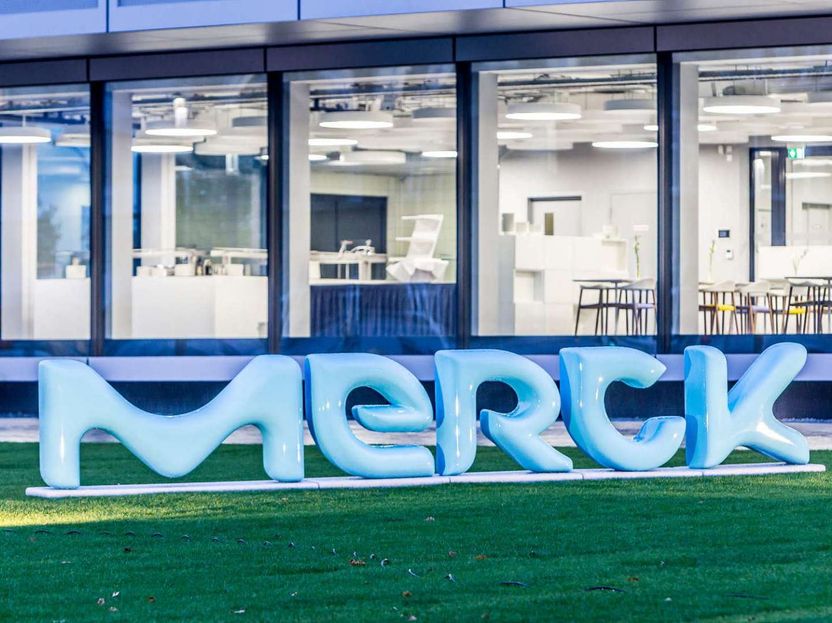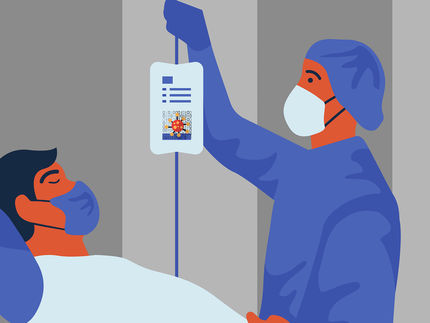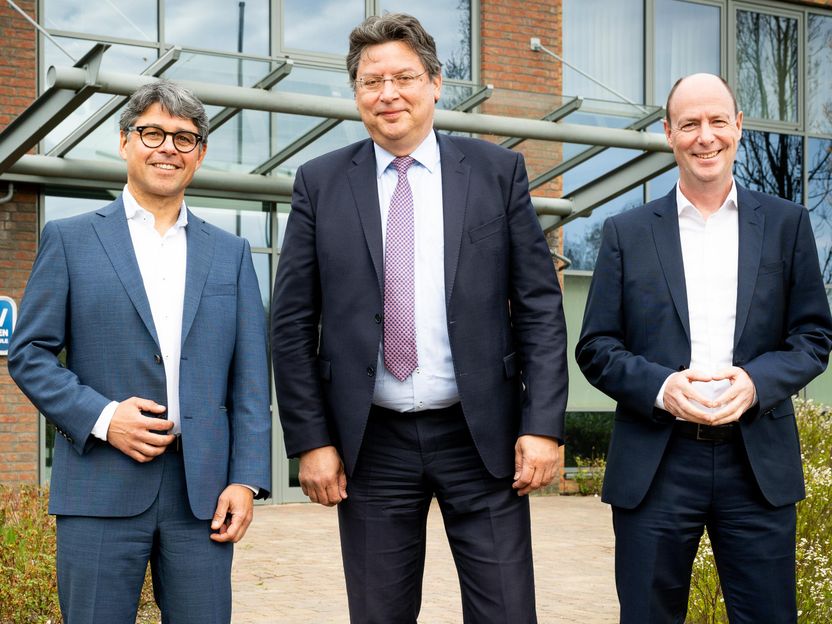Merck Reports Record Results in a Turbulent Year
Merck had a successful fiscal 2020, a year that was marked by the Covid-19 pandemic. The company increased its sales, expanded its EBITDA pre margin and met all the financial targets it had set for itself. The key drivers were the business with products and services for pharmaceutical manufacturing from the Life Science business sector, the new medicines Mavenclad and Bavencio approved in recent years as well as the Semiconductor Solutions business.

Merck KGaA
“The year 2020 was characterized by unprecedented turbulence. Yet despite the circumstances of the pandemic, we resolutely executed our strategy further and achieved truly superb business results,” said Stefan Oschmann, Chairman of the Executive Board and CEO of Merck. “Particularly the past 12 months have once again uniquely proven the performance capability of our differentiated business model comprising three strong business sectors. Our focus on innovation-driven specialty businesses is paying off. Merck is very well positioned for a successful future,” said Oschmann.
During the pandemic, Merck did everything possible to protect the health of employees while ensuring business continuity. In addition, the company contributed substantially to the global fight against the pandemic. For instance, Merck is supporting more than 50 vaccine projects. Merck recently announced plans to expand its strategic partnership with BioNTech and to significantly accelerate the supply of urgently needed lipids, which are used to manufacture the Covid-19 vaccine from Pfizer-BioNTech. The company also plans to increase the amounts it supplies towards the end of 2021.
Rigorous strategy execution
In 2020, Merck moved forward with the implementation of its priorities. “We have resolutely pursued our ambition: Merck is to become the vibrant science and technology company,” said Oschmann. Healthcare made further progress with its development pipeline and continues to aim for around € 2 billion in sales from new products in 2022. Among other things, in 2020 the company received approval in the United States for its immuno-oncology medicine Bavencio as a maintenance therapy for patients with locally advanced or metastatic urothelial carcinoma (UC) that has not progressed with first-line platinum-containing chemotherapy. Approvals in Europe and Japan followed in January and February 2021, respectively. In March 2020, Merck announced the approval of Tepmetko in Japan for the treatment of patients with unresectable, advanced or recurrent non-small cell lung cancer (NSCLC) with MET exon 14 (METex14) skipping alterations. This was the first regulatory approval globally for an oral MET inhibitor indicated for the treatment of advanced NSCLC harboring MET gene alterations. The corresponding approval was granted by the U.S. Food and Drug Administration in February 2021.
The Life Science business grew very strongly in 2020 – despite the partly substantial limitations caused by the closures of numerous laboratories, above all in the second quarter of 2020. The products and services supplied by Life Science play an important role in fighting the Covid-19 pandemic. The business sector is involved in more than 35 testing solutions, 50 vaccine projects and 20 programs for the development of Covid-19 therapies. Furthermore, during 2020, Merck pressed ahead with a number of measures to expand Life Science production capacities, including a new membrane plant at its global headquarters in Darmstadt, Germany, and the expansion of its site for viral and gene therapy manufacturing in Carlsbad, California, United States. In December, the company announced plans to expand its U.S. production facilities in Danvers, Massachusetts, and in Jaffrey, New Hampshire. These sites supply critical products and services for biopharmaceutical manufacturing customers, including those that develop life-saving therapies and Covid-19 vaccines.
Performance Materials continued to implement the Bright Future transformation program and has focused its business on the electronics market. This includes the launch of a new, customer-centric organization within the Semiconductor Solutions business unit. To underscore the business sector’s strategic focus on the electronics industry, effective immediately it will operate under the name “Electronics”. “The new name Electronics sums up what this business is all about, namely technologies that advance digital living,” said Oschmann.
Group sales increased in 2020 by 8.6% to € 17.5 billion. Organically, sales increased by 6.0%. Portfolio effects lifted sales by 5.3%. This was offset by negative foreign exchange effects of -2.6%. EBITDA pre, the most important financial indicator to steer operating business, rose by 18.6% to € 5.2 billion; the EBITDA pre margin increased to 29.7%.
The operating result EBIT soared by 40.8% over the previous year to € 3.0 billion; Group net income climbed 50.5% to € 2.0 billion during the same period. Net financial debt decreased by -13.0% to € 10.8 billion in 2020.
Earnings per share pre, which is a determinant of the Merck dividend, increased by 20.5% to € 6.70 in 2020. In line with the company’s sustainable dividend policy, the Executive Board and the Supervisory Board will therefore propose a dividend of € 1.40 per share, an increase of € 0.10 over the previous year.
Q4: Sales growth in all three business sectors
In the fourth quarter of 2020, Group sales increased by 5.0% compared to the prior-year quarter. Organically, Group sales grew by 11.0%, driven by all three business sectors. Additionally, there were negative foreign exchange effects of -5.4% and a portfolio effect of -0.6%. EBITDA pre rose by 3.3% to € 1.2 billion, earnings per share pre increased 1.9% to € 1.57.
Environmental targets exceeded – Sustainability strategy with clear goals
Merck exceeded its environmental targets for 2020. Excluding the legacy Versum business, the company lowered its greenhouse gas emissions (Scope 1 and 2) by -25% relative to the 2006 baseline. A reduction of -20% was planned. The company cut its water consumption at sites in water-stressed areas by -27% relative to the 2014 baseline; a reduction of -10% had been planned. With respect to waste disposal and the Merck Waste Score, Merck believes that it is well on track to meeting its target of lowering this key waste management indicator by -5% by 2025. At the end of 2020, Merck had achieved a reduction of -4.6%.
Merck already presented its new sustainability strategy back in November 2020. The company has consequently embedded sustainability even more strongly as an essential component of its corporate strategy. With its sustainability strategy, Merck is pursuing three clear goals:
- Goal 1: In 2030, Merck will achieve human progress for more than one billion people through sustainable science and technology.
- Goal 2: By 2030, the company will integrate sustainability into all its value chains.
- Goal 3: By 2040, Merck will achieve climate neutrality and reduce its resource consumption.
To support the achievement of the goals set out in its sustainability strategy, the company has formulated specific environmental targets for 2030. These include lowering direct greenhouse gas emissions as well as emissions from energy purchases (Scope 1 and 2) by -50% by 2030 in comparison with 2020. Moreover, it means reducing indirect greenhouse gas emissions from the upstream and downstream value chain (Scope 3) by 1,500 metric kilotons of CO2 equivalents by 2030.
Fiscal 2020 by business sector
Healthcare: Mavenclad and Bavencio generate strong growth
Sales by the Healthcare business sector declined by -1.1% to € 6.6 billion in 2020. Organically, net sales rose by 3.4%. However, this increase was offset by negative foreign exchange effects of -3.6% as well as a portfolio effect of -0.9% from the divestment of the allergy business Allergopharma. Mavenclad and Bavencio, two new medicines approved in recent years, were the key drivers of organic growth in Healthcare.
In 2020, the Oncology franchise grew organically by 12.0%, mainly thanks to the immuno-oncology medicine Bavencio, which delivered organic sales growth of 57.4%. This growth was predominantly thanks to U.S. approval as a first-line maintenance treatment for patients with locally advanced or metastatic urothelial carcinoma (UC) in June 2020. Sales of the oncology drug Erbitux grew organically by 6.0%.
The Neurology & Immunology franchise delivered organic sales growth of 6.7% in 2020. This growth was driven by the organic increase in sales of Mavenclad by 70.5%. Prescription rates for this oral, short-course treatment for highly active relapsing multiple sclerosis (MS) temporarily declined in a market environment adversely impacted by the Covid-19 pandemic. However, the second half of 2020 in particular showed strong signs of a recovery, supported by new safety data indicating that patients treated with Mavenclad who acquire Covid-19 are not at an increased risk of severe outcomes. Mavenclad was approved in additional countries in 2020, bringing the total number of countries in which the product is registered to more than 80 worldwide. Sales of the Fertility franchise declined organically by -10.7% in 2020 owing to the effects of the Covid-19 pandemic, particularly in the second quarter. Sales recovered in the second half of the year. The General Medicine & Endocrinology franchise generated organic growth of 5.9% in 2020.
EBITDA pre of Healthcare rose by 18.0% to € 2.3 billion in 2020. Organic earnings growth amounted to 26.6%. The EBITDA pre margin rose by more than five percentage points to 34.1%. This was attributable not only to income from the release of the provision of € 365 million for the Biogen patent litigation, but also to rigorous cost management.
Life Science: Process Solutions grows organically by 21.8%
Net sales of the Life Science business sector grew by 9.5% to € 7.5 billion in 2020. Organic sales growth amounted to 11.8%. Currency headwinds of -2.3% were incurred.
All three business units contributed to the organic growth of Life Science, with the greatest amount coming from the Process Solutions business unit, which markets products and services for the pharmaceutical production value chain. In 2020, it generated organic sales growth of 21.8%. The strong organic growth of Process Solutions was equally attributable to the Covid-19 pandemic and to the generally high demand for products and service offerings. The Research Solutions business unit, which provides products and services to support life science research for pharmaceutical, biotechnological and academic research laboratories, delivered organic sales growth of 4.6% in 2020. This was due to a recovery of the base business in the second half of 2020 and mainly to additional, pandemic-related demand. In 2020, the Applied Solutions business unit, which supplies products for researchers as well as scientific and industrial laboratories, delivered organic sales growth of 3.3% in a challenging business environment affected by lockdowns.
EBITDA pre of Life Science rose by 13.0% to € 2.4 billion in 2020. The earnings margin, i.e. EBITDA pre as a percentage of net sales, improved by one percentage point to 32.0%.
Electronics: Semiconductor Solutions grows faster than strong semiconductor market
Sales of the Electronics business sector, which previously operated under the name Performance Materials, rose by 31.3% to € 3.4 billion in 2020. The acquisitions of Versum Materials and Intermolecular contributed 35.4% to the growth of Electronics, but an organic decline of -3.2% and a negative exchange rate impact of -0.9% partially offset the portfolio effect.
In Semiconductor Solutions, the strong improvement in the underlying semiconductor markets helped drive organic growth of 14.3% in fiscal 2020. The Display Solutions business unit, consisting mainly of the business with liquid crystals, photoresists for display applications and OLED materials, saw an organic sales decline of -11.7% in fiscal 2020. Net sales of the Surface Solutions business unit fell organically by -13.5% in fiscal 2020 owing to the pandemic-related decline in demand, first and foremost in the automotive and cosmetic markets.
In 2020, the Electronics business sector increased its EBITDA pre by 27.5% to € 1.0 billion; the EBITDA pre margin was 30.3%.
Forecast: Merck expects strong organic growth in 2021
As regards the Covid-19 pandemic and the negative effects thereof, Merck assumes that the business recovery that started in the second half of 2020 will continue in fiscal 2021. At present, the company does not assume that further disease waves will have a negative effect comparable to that seen in the first half of 2020, especially on the Healthcare and Electronics business sectors. For Life Science, Merck expects significantly positive contributions owing to the Covid-19 pandemic, particularly in the Process Solutions business unit. In addition, the increasing availability of Covid-19 vaccines and the associated immunization of the population should contribute to a further stabilization of the societal and economic situation. Nevertheless, the current forecast is subject to a higher degree of estimation uncertainty compared with past years.
Merck expects that in fiscal 2021, the Group will deliver strong organic net sales growth, driven mainly by the Healthcare and Life Science business sectors. For Electronics, the company forecasts a solid organic increase. With regard to exchange rate developments, Merck continues to expect a volatile environment due to political and macroeconomic developments. The company expects negative foreign exchange effects between -2% and -5%. These will result in particular from the development of the U.S. dollar as well as individual growth market currencies.
For fiscal 2021, Merck forecasts organic growth of EBITDA pre in a high single-digit to low teens percentage range – excluding the release of the provision in 2020. The company assumes that organic growth in all three business sectors will contribute to this development. Including the income from the release of the provision in autumn 2020, Merck expects to see slight to moderate organic growth of EBITDA pre. The forecast foreign exchange development is expected to adversely affect Group EBITDA pre by between -2% and -5% compared with fiscal 2020; this effect is likely to be seen mainly in the Healthcare and Electronics businesses. In this context, Merck assumes that in particular, the euro-U.S. dollar exchange rate will impact foreign exchange developments.
























































